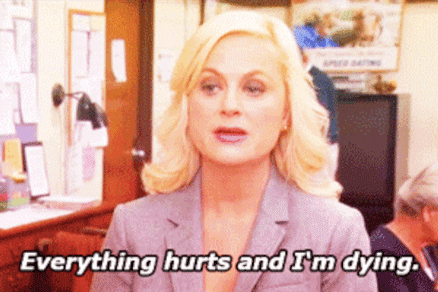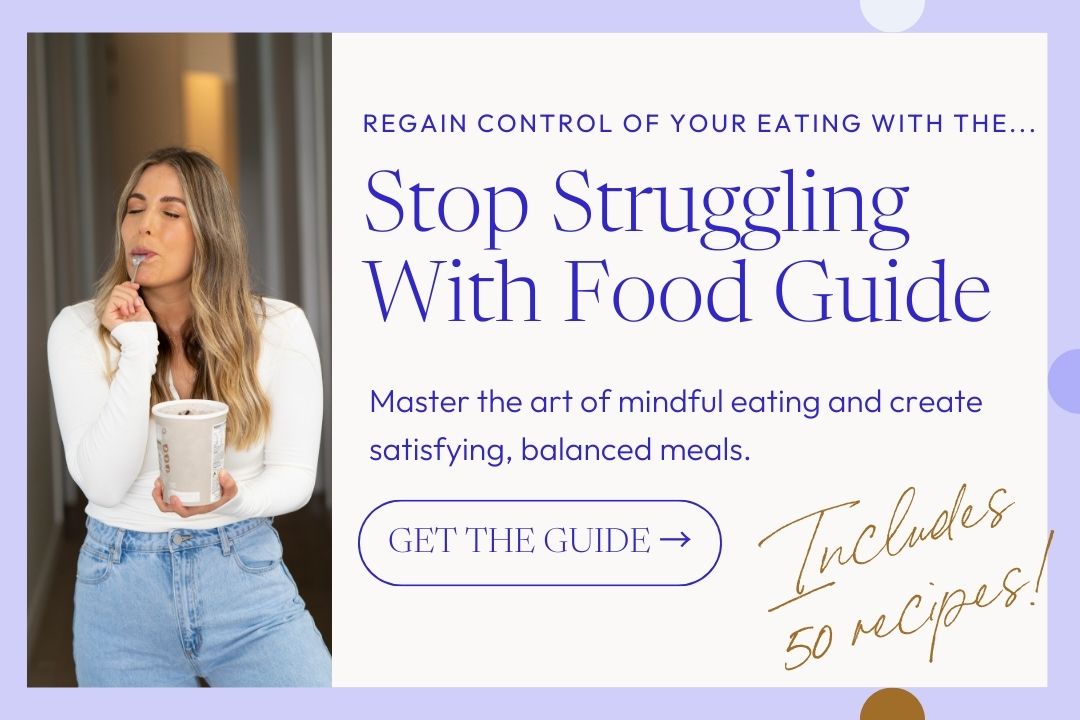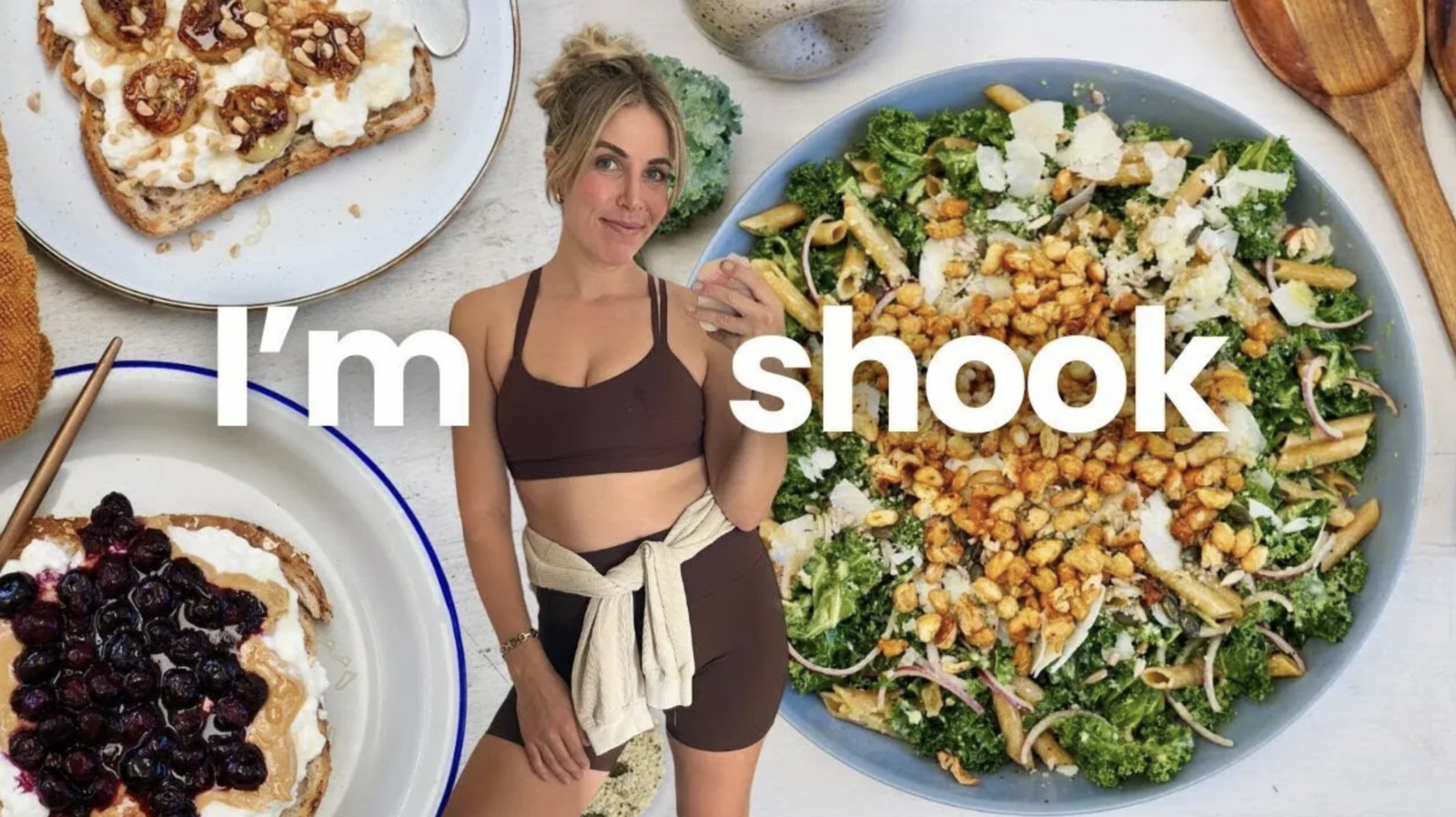As you approach the big M, the fear-mongering can be overwhelming.
You might be wondering “can I prevent weight gain in menopause?” or you find yourself bombarded with messages about weight gain, slower metabolism, muscle loss – you name it, it’s all on the menu. And boy, does it sound scary!
And so begins the dieting dilemma
This flood of info makes us feel like we need to tighten the reins on our eating habits. We’re told to control it more to dodge these inevitable changes. Leading to restrictive eating, which then spirals into overeating and, you guessed it, that vicious dieting cycle.
And stats don’t lie; that cycle usually ends in weight gain.
Sure, there are huge biological shifts going on. Hormones are on a rollercoaster ride, metabolism slows down a notch, and there’s a bit of muscle mass lost. But is it as catastrophic as we’re led to believe? Not really.

Enjoyable movement and a healthy food relationship is where the gold lies
For many hitting menopause, it’s not just about battling biological changes; it’s about wrestling with past dieting baggage. This added pressure to lose weight or prevent weight gain can push all those unhealthy food habits right to the surface. And if you’ve been hating your body for years, it’s going to take some time to repair that relationship.
So, what’s the game plan?
Firstly, find a reliable health professional to navigate these stormy menopausal seas. It’s not just about the hot flashes. Menopause can impact sleep, heart rate, body image and bone health.
Ignore the diet blush*t
This is where intuitive eating comes into play. It’s all about eating within your energy needs. No need to cut portion sizes or change your diet drastically. Plus, your cravings might shift along with the changes if you’re in tune with your body.

Work on your relationship with food
Now, about food. Don’t try to restrict yourself only to end up on an eating spree. Build healthy habits, create that intuitive relationship with food. Listen to your hunger cues; they know better than any diet plan. Skip those Pinterest ideas banning sugar or demonising gluten. That’s just nonsense.
My advice:
Focus on food that makes you feel full, satisfied and happy. If you want to manage your weight, then try cooking at home more, eating enough satisfying foods and working on your relationship with food.
And if you struggle with binge or emotional eating, my Binge Free Academy is brilliant and highly recommended (trusted by 5,000 others)!
Accept that your body is imperfect
“I wish I was as thin as when I first thought I was fat” is a phrase that resanates with every woman who has ever thought she needed to lose weight.
Haven’t you wasted enough time wishing you weighed less? If you had the chance, you’d probably want to shake that younger version of yourself and yell, “Just enjoy this body while you have it! I wish I looked like that now! It’s good enough!”

Well, just imagine how you’ll feel about this current body you have in 10, or 20 years time.
Body image can take a hit during menopause, and that’s normal. Hard, but normal. Treat yourself kindly. A closet cleanse can make a significant difference in how you perceive your changing body. If it means getting new clothes, swimsuits or bras that fit and make you feel good, go for it.
📘💫BOOK TIP: If you struggle with your body or your weight, it’s likely that diets and diet culture are keeping you stuck in a vicious cycle, full of empty promises and failed attempts. If you want to build real health and body confidence, check out my best-selling book Your Weight is Not the Problem. Get the deets and access to a free audio sample of the book HERE.
Moving your body matters too. And it’s not just about maintaining a healthy weight.
After menopause, women face a higher risk of breast cancer. But staying active can make a big difference. Studies show that regularly active women have a 25% to 30% lower chance of getting breast cancer after menopause, compared to inactive women.
Strengthening exercises, finding an activity that feels good—these are crucial, especially as our energy levels dip. Remember: A 10 minute walk that you enjoy is better than an hour at the gym that never happens.
A little less booze
Reducing how much alcohol you drink during menopause is also vital for managing symptoms, bone strength, hormone balance, quality sleep and reducing breast cancer risk. So building a healthy relationship with booze is important. And if you want to learn how to drink less to feel your best – then consider doing a litte Booze Break.
I promise, focusing on these healthy habits will make this period feel a lot less scary. Here are some more ideas: 29 surprisingly simple healthy habits.
Bottom line
It’s a tough period, no doubt. But don’t let it become a bigger monster than what it is. Menopause is a journey, not a crisis. And please, no cutting out entire food groups! Eat intuitively, move with enjoyment (and maybe lots of aircon!), and forgive yourself for not being perfect.
